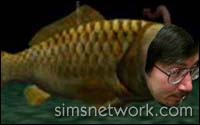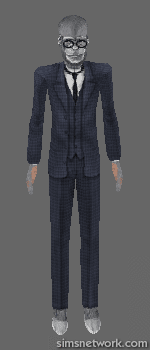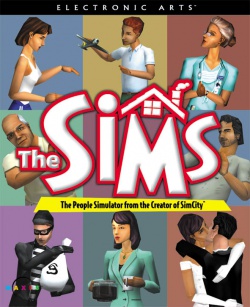Interview With Will Wright - Part 2

Happy Puppy interviews Will Wright!
Go to HappyPuppy.com, or click below to read part 2 of the interview!

Will Wright interview
by Avi Fryman and Libe Goad
In Part I of our interview with Will Wright, the Maxis co-founder and chief designer shared his insights on PC gaming, the evolution of artificial intelligence, why a SIMpsons game is unlikely, and more. Part II delves into stranger territory, as we discuss sadism, Simlish, online gaming, Hollywood, Seaman, Super Chiabot, and why helicopters are cool. Read on.
WW: Oh yeah. In fact, I know [Seaman designer] Yoot Saito very well. He's a very close personal friend. He did SimTower for us several years ago, and I got to know him and his family actually before that. So, yeah. Yoot's a character. [laughs] Sort of like a cowboy.
HP: [laughter] In preparing for this interview, we talked about games that we became really emotionally involved with, and Seaman is definitely one of them. When Seaman dies, you get really distraught.
WW: Yeah, Yoot's great because he's so twisted, you know? He's a writer, so in Seaman he did a very good job of finding a way to fully leverage his talents as a writer. Because he designed the whole kind of discussion that he takes you through, and it's just amazing how you all of a sudden start realizing, you know, that he's keeping track of all this stuff and he's about to use it against you. That's when you get really creeped out.
HP: Did you like the AI in Seaman? Did you think it was good AI?
WW: Well actually, he was very brute force. You know, technically it wasn't impressive, but design wise and execution wise, it was brilliant. And the emotional response I had to the thing was just amazing, you know, considering that it was this brute force approach. And it was really [via] Yoot's skill as a writer that he managed to kind of twist it around and make you feel that. Yeah, it was very remarkable in fact. Very creepy. After Seaman died…I had been raising him for about three weeks, and I thought I had set the clock back, because I had missed feeding him for like two days...but I had set the clock back wrong, and I was like, "oh shit." And I never booted it up again.
 HP: Speaking of AI, in the movie A.I., there's a sort of gladiatorial scene...
HP: Speaking of AI, in the movie A.I., there's a sort of gladiatorial scene...
WW: Oh, the middle part of the movie. Yeah, that was the part that I didn't like.
HP: But in a way, it's similar to Battle Bots. Can you tell us a bit about your involvement in that?
WW: Yeah, I've been doing that ever since the first Robot Wars, back in 1984. In fact, that's actually kind of what got me into computers originally, was robots. I mean, I've always built robots, kind of as a side hobby. And at some point I bought an Apple II to attach to my robots, so that's when I started playing around with computer programming, and eventually got into games. Yeah, I've actually been building robots on the side, you know, forever. But yeah, I've been a big winner the first few years, when the competition wasn't so tough, in one of the lightweight divisions the first year, and the middleweight the next year. My daughter and I do it together. I'm actually building a new one now. I've never usually taken the time. I usually throw something together about three weeks before the event. I'm actually building a decent one now, so I'm about halfway done with it.
HP: What were the names of your old ones?
WW: Well, I haven't had one in a couple of years. My daughter, I built one with her. Hers is [Super] Chiabot. It's this robotic shrub. [laughter] So, we've used that one for the last two events. Before that I had several, like six different robots for different years. The first one was Julie Bot. Kitty Puff Puff. Bob Smith was one, um, My Little Pony....
HP: Whereas a lot of people find themselves emotionally attached to their Sims, others treat them like pawns in a sadistic house of horrors. What's your take on pushing The Sims, which has a sort of cartoonish sheen to it, more towards the reality, hyper-realism arena?
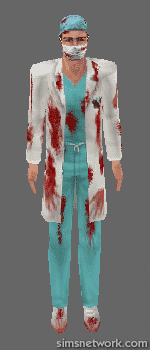 WW: Well, in some ways we've kind of settled on that level of representation and that kind of emotional tone. In fact, there were a couple of things that were more realistic that we took out. And we did a lot of tweaking related to it. For instance, if the Sims don't like each other, you can get them to slap each other. We've got two slaps in the game. We've got one that's kind of this bring your arm back, really wack them like you're breaking their jaw type of thing. And a lot of people, if they had a situation where they had a man and a woman living together, and they saw a situation like that, it really rubbed a lot of people the wrong way. It felt very domestic violence-like. So we changed the programming, so that if a man is slapping a woman, you get more of this kind of British army officer polite slap. Slap, slap, slap, slap, you know? It's kind of an insulting slap, rather than a sort of "I'm going to hurt you" slap.
WW: Well, in some ways we've kind of settled on that level of representation and that kind of emotional tone. In fact, there were a couple of things that were more realistic that we took out. And we did a lot of tweaking related to it. For instance, if the Sims don't like each other, you can get them to slap each other. We've got two slaps in the game. We've got one that's kind of this bring your arm back, really wack them like you're breaking their jaw type of thing. And a lot of people, if they had a situation where they had a man and a woman living together, and they saw a situation like that, it really rubbed a lot of people the wrong way. It felt very domestic violence-like. So we changed the programming, so that if a man is slapping a woman, you get more of this kind of British army officer polite slap. Slap, slap, slap, slap, you know? It's kind of an insulting slap, rather than a sort of "I'm going to hurt you" slap.
HP: Like a glove slap?
WW: Yeah, exactly. So, we changed it. If a man is hitting a woman, or a woman is slapping a man, you get that kind of um, insulting slap. But if it's a woman against a woman or a man versus a man, then they use the really strong arm slap. And that's just like one example. And oddly enough, that slap was offensive to more people or just kind of made people more uncomfortable than the attack, which is much more cartoonish. When they jump on each other, and there's this big cloud, and you see the arms and legs poking out. You know, that feels more like Road Runner. And nobody really had a problem with that. So, it was when we were going in the direction of more realism that it started really ticking off people. And we wanted it to be accessible to a fairly young audience.
Can Will speak Simlish? Will all Sims go to heaven?
HP: How much of you is in these games? Are there private jokes in there? How much Will Wright are we playing with?
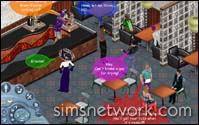 WW: Well, really, a lot of it is, of course, a big team effort. And I get a lot of the credit for these things, but in fact, you know, there are large teams of people that are all pouring their hearts and souls into these games. So in some sense, I become more like the marketing figurehead. I'm the one that they send out for the cameras, but really I represent all these people. And so…the whole team has put little bits and pieces of themselves throughout the entire game, in every little detail. We had one guy, he was a producer of The Sims, and it turned out that he was just a really excellent writer, especially when he's writing something in a sort of sarcastic tone. And so when we discovered this, we had him, he basically wrote all of the catalogue text in the game, which I thought turned out excellent. I don't know if you've read the catalogue descriptions, but you know, believe me, after you've written a kind of a catalogue advertisement for a chair…for 40 chairs, and after writing the 41st one, and still make it funny and interesting…that's art, you know? And that's just one guy. And if you go through and read all of the catalogue text, I mean, there's just a huge amount of himself that he's placed in this game. And the sound guys, that did all the voice recording, all the voice actors, they spent a lot of time and effort developing kind of Simlish, you know, in the voice-acting space. So, unless you kind of take the program apart, piece by piece, and look at all the different parts, it's hard to realize how many people put so much stuff into just one game like this.
WW: Well, really, a lot of it is, of course, a big team effort. And I get a lot of the credit for these things, but in fact, you know, there are large teams of people that are all pouring their hearts and souls into these games. So in some sense, I become more like the marketing figurehead. I'm the one that they send out for the cameras, but really I represent all these people. And so…the whole team has put little bits and pieces of themselves throughout the entire game, in every little detail. We had one guy, he was a producer of The Sims, and it turned out that he was just a really excellent writer, especially when he's writing something in a sort of sarcastic tone. And so when we discovered this, we had him, he basically wrote all of the catalogue text in the game, which I thought turned out excellent. I don't know if you've read the catalogue descriptions, but you know, believe me, after you've written a kind of a catalogue advertisement for a chair…for 40 chairs, and after writing the 41st one, and still make it funny and interesting…that's art, you know? And that's just one guy. And if you go through and read all of the catalogue text, I mean, there's just a huge amount of himself that he's placed in this game. And the sound guys, that did all the voice recording, all the voice actors, they spent a lot of time and effort developing kind of Simlish, you know, in the voice-acting space. So, unless you kind of take the program apart, piece by piece, and look at all the different parts, it's hard to realize how many people put so much stuff into just one game like this.
HP: Can you speak Simlish?
WW: Uh…sometimes. Not in the morning, though.
HP: [laughter] Getting back to the sadism theme for a second, are there going to be safeguards against sadistic behavior in The Sims Online?
WW: Yeah, in fact one of the biggest things in online games is grief players. And there are going to be a lot of things that are going to be fairly negative in The Sims Online that are appropriate for the gameplay. You know, it's appropriate to go up and slap somebody in certain instances. But if they don't like it, they have to have the ability to kind of filter you out or ignore you. So we have to have a lot of controls like that. Or if you create your own house or club or business in The Sims Online, if there are roving bands, gangs coming in, trying to disrupt what you're doing, you have to have the ability to kind of kick them out or keep them out of your house or business. So, a huge topic for us is moderating the kind of user-to-user grief play. That's a long topic too.
HP: Is there any concern about virtual streaking, for example?
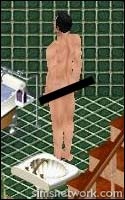 WW: Well, actually, we're not concerned about any one thing in particular. What we're concerned about is just anything that the other players might find offensive. And for different people, that's going to be different things. And so, we don't want to be in the position of saying well, you can do that but you can't do this. What we want to do is give the other players tools to then decide, this person is really bugging me. Even if they think they're playing the game perfectly, but you don't. Or maybe it's just the topics they tend to chat about. Or maybe it's they're cheating at the business. There are so many things, we cannot begin to imagine them all. And if we could, that would just be a sign that the game isn't very interesting. The fact that the game is so open-ended means that we shouldn't even try to imagine all the different ways that a player can bug another player. So, all we can really do is put in a lot of controls that are easily accessible, so if somebody really is bothering you in the game, you can filter them out.
WW: Well, actually, we're not concerned about any one thing in particular. What we're concerned about is just anything that the other players might find offensive. And for different people, that's going to be different things. And so, we don't want to be in the position of saying well, you can do that but you can't do this. What we want to do is give the other players tools to then decide, this person is really bugging me. Even if they think they're playing the game perfectly, but you don't. Or maybe it's just the topics they tend to chat about. Or maybe it's they're cheating at the business. There are so many things, we cannot begin to imagine them all. And if we could, that would just be a sign that the game isn't very interesting. The fact that the game is so open-ended means that we shouldn't even try to imagine all the different ways that a player can bug another player. So, all we can really do is put in a lot of controls that are easily accessible, so if somebody really is bothering you in the game, you can filter them out.
HP: Do you foresee any kind of player killing?
WW: The way we're doing killing in The Sims Online is weird. It's still very much in the kind of comic format. So, in fact, you can die in The Sims Online, and you turn into a ghost. And you can still do everything, except now you're a ghost. Until you leave that place and go back to your house. And then all of a sudden you're reconstituted as a real Sim. So, death doesn't really have any penalty like losing skill points or anything. But, in fact, we'll see people having sort of Halloween parties where the first thing you do when you come to the house is get killed, become a ghost, and then have a big ghost party, you know?
HP: Will being killed still be mostly on your own account, or will Sims be able to kill each other?
WW: Um, well, we're kind of working on that. There probably will be some way. But again, there's really not going to be any penalty, it's more like, "tag, you're it." So, we're assuming that people are going to use it more as, in social settings, kind of a fun thing. We're trying to do a lot of things with The Sims Online where the players can actually create their own games out of the parts and objects. So there might be some game kind of like freeze tag or something like that, where you get tagged and you turn into a ghost, and you stay that way until somebody unfreezes you.
Will futuristic computers make nice, dull friends?
HP: What's the most important thing you've learned about yourself in the process of game making?
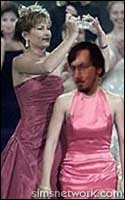 WW: Wow. That's a question. This sounds like one of those Ms. America questions. [laughter] Oh gosh, um, I guess not to take myself too seriously. And in fact, that has less to do with making games and more to do with working with a lot of large teams on difficult projects that go through emotional ups and downs. You definitely have to always step back and take what you're doing less seriously. Basically to manage stress, because making a game can actually be quite stressful. And I know a lot of people who have come and gone in the games business that lasted like four or five years, and the ones that have lasted 10 or 20 years are the ones that have kind of figured that out. You know, sometimes you have to just kick back and say, "OK, this is not the end of the world." You just need to be able to enjoy it.
WW: Wow. That's a question. This sounds like one of those Ms. America questions. [laughter] Oh gosh, um, I guess not to take myself too seriously. And in fact, that has less to do with making games and more to do with working with a lot of large teams on difficult projects that go through emotional ups and downs. You definitely have to always step back and take what you're doing less seriously. Basically to manage stress, because making a game can actually be quite stressful. And I know a lot of people who have come and gone in the games business that lasted like four or five years, and the ones that have lasted 10 or 20 years are the ones that have kind of figured that out. You know, sometimes you have to just kick back and say, "OK, this is not the end of the world." You just need to be able to enjoy it.
HP: What's the biggest hurdle you've had to overcome during your career?
WW: Oh gosh. Well, while getting Maxis off the ground we had a lot of hurdles like running out of money and stuff like that. Then there were creative hurdles. You know, getting The Sims out was a huge hurdle for me, and it was such a long, long process. A lot of people didn't really like the idea or see much potential in it. But it was just a matter of me fighting for the thing for year after year after year and finally getting it out the door. So that, to me, felt like as hard a project to do as I've ever done, for that very reason.
HP: What's the strangest request or general interaction you've ever had with a user?
WW: Oh, gosh. I have to think about that one for awhile. Of course, the standard is the "hire me, I want to design games" one. I get that all the time. A few people have wanted to be in the games. You know, "make me a Sim, I want to be in the game." A lot of requests from strange organizations and whatnot that want us to do a sim of this, that, or the other. I've gotten a huge number of those over the years. In fact, we were getting requests from the Department of Defense, the CIA, the Australian Tax Board, the Canadian Railways, I mean…
HP: And what did they want you to do exactly?
WW: They wanted us to do simulations for them, basically. You know, of the Canadian rail system, or intelligence gathering in Third World countries, or why Australians should pay their taxes. They were all convinced that we could do a simulation that would all of a sudden solve their problems. [laughs]
HP: What do you see yourself working on five years from now?
WW: Five years from now. Well, I'll definitely be working on robots. That's a given. On the software side, I think intelligent agents, to me has been a long-time attraction. It has for 20 years so far, 25 years probably. And I can see that I would still be working on some form of machine intelligence. I want to be able to just sit there and just have a conversation with my computer one day. Even if it's kind of boring, it could turn into one of my duller friends, you know. [laughter] I would just be fascinated by the thought process.
HP: Is there anything that you saw at E3 that blew you away, or at least impressed you substantially?
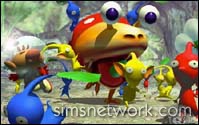 WW: I thought Pikmin was cool. I know a lot of people were kind of perplexed by it, but for me it felt like kind of a SimAnt type game. I liked the scale a lot. You know, the fact that it was zoomed in, really close. And I thought it was really neat, because it kind of went with the grain of the computer, or the hardware it was on. Rather than trying to make everything ultra-realistic and super-textured, they actually had the little characters as kind of Day Glo plastiform type things, you know? They had their own look, which made them stand out from the realistic textured backgrounds very nicely. But their motion really carried them. I thought it was, just artistically, a very beautiful thing to watch. Um, what else did I see? There were a couple of things I looked at that looked interesting. I'm a big fan of Alex Garden's. I loved Homeworld, so I was looking at Sigma, and that looked pretty cool.
WW: I thought Pikmin was cool. I know a lot of people were kind of perplexed by it, but for me it felt like kind of a SimAnt type game. I liked the scale a lot. You know, the fact that it was zoomed in, really close. And I thought it was really neat, because it kind of went with the grain of the computer, or the hardware it was on. Rather than trying to make everything ultra-realistic and super-textured, they actually had the little characters as kind of Day Glo plastiform type things, you know? They had their own look, which made them stand out from the realistic textured backgrounds very nicely. But their motion really carried them. I thought it was, just artistically, a very beautiful thing to watch. Um, what else did I see? There were a couple of things I looked at that looked interesting. I'm a big fan of Alex Garden's. I loved Homeworld, so I was looking at Sigma, and that looked pretty cool.
HP: Yeah, that's pretty out there.
WW: Yeah, and it had that same Homeworld-friendly feeling. You know, when I saw Homeworld at E3 many years ago, I remember seeing it and thinking, "God, there's no way that's going to be playable in 3D like that. It can't be done." But then I got a copy of it, and it was like a blast, I loved it, the interface was great, you know? I didn't really see anything like that this year. I checked out the Xbox stuff, and it looked really nice, but then you realize it's running on a 16:9 digital monitor, and then you look at it on NTSC, and it doesn't look all that great compared to anything else really.
HP: Plus, the gameplay is pretty much lacking at this point.
WW: Yeah, and I mean, the PlayStation2, they're finally getting a lot of stuff and some of it's starting to look pretty good. But nothing really struck me. I thought Star Wars Galaxies looked great. Nothing else comes to mind.
Sims: The Movie, anyone?
HP: Are there any other games you've played, aside from your own, that have influenced or inspired you?
WW: Oh yeah, all the time. I play a lot of games. Usually, I play like one first-person shooter a year, just to check in on those. I like Deus Ex. Enjoyed it. I actually enjoyed Clive Barker's Undying quite a bit. The sound design in that was awesome. I played Black & White. I thought the empathy with the creature and the facial expressions, and his body language was excellent.
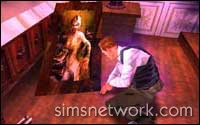 HP: Do you play console games?
HP: Do you play console games?
WW: Those I play with my daughter. So she's always dragging me to play those. We haven't bought a PlayStation 2 yet. I was going to buy one, but I haven't really seen a killer game that I've wanted. And after E3, I realized I need to get a GameCube. That's kind of obvious. Partially just because I want to play every game that Miyamoto makes. Of course, we played Zelda forever, and it's just a brilliant game. Harvest Moon is a cute little game on the Nintendo. I actually haven't played any PS2 games, I just watch people play 'em here at the office. We do have a Dreamcast that Yoot sent me so we could play Seaman, so we have a lot of Dreamcast games.
HP: How do you feel about the future of gaming as it now seems to be developing, and online gaming in particular?
WW: Well, it's definitely getting more mainstream. What's happening with all of the people who were playing Nintendo and Sony games as teenagers, is they're growing up and now buying computers, and still playing games. So, for these people, playing games is as natural as going to the movies or watching television. So I think there's this slow generational shift going on, where 10 years from now, most of the adults in America will spend a certain amount of their time playing games. And it'll be just perfectly normal. And it won't be considered so much this kid-like thing.
At the same time, there will be, I think, a better selection of games that will appeal to adults, and not just kids. That's the point at which gaming will have truly entered the mainstream. So I think you're going to start seeing games thematically broaden out a lot more from where they're at. You know, right now you go into a software store and most of the games are military, fantasy, sports, or the other big one. There's one more, fighting? Science fiction, that's it. Um, but you know, really you go into a bookstore and you see many more sections than just that. And in fact if you look at movies or TV or books, there's a large collection of them that are actually based around contemporary life, and they don't involve magic or fantasy or science fiction. They're about the issues that people face in day-to-day life. You get this in sitcoms or most movies really. And you see that in games hardly at all. You know, games have always been very extreme, at almost comic-book levels, about as far away from reality as you can get. But in fact, I think that some of the most interesting gaming experiences are going to be the ones that are focused around things that are much more relevant to your day-to-day life. And I think those are the things that are going to appeal to a much more mainstream audience in general.
HP: So Will, we want to know: when are you going Hollywood?
WW: Hollywood? Well, actually, I'm doing a little project on the side with some friends. We're working on a little kind of video project. And we're thinking about possibly television. But it's kind of an artificial intelligence tale set in feudal Japan, filled with puppets, kind of a la Nightmare Before Christmas. So it's something I'm kind of doing on the side to learn. It's not like I really want to go do the Hollywood thing. But it's more I'm interested in really fully understanding linear media. Especially as it's eventually going to relate to The Sims 2, because in that we want to get a much more kind of cinematic representation. You know, full 3D with interesting camera logic and stuff. So, in fact, there's a couple of robot video projects that I'm toying around with the idea of. We build robots, and go out and film them in the real world interacting with people and see how they relate to machines. I'm very interested in the way that people relate to mechanical intelligences and what they ascribe to them. So I think it would be the basis of some interesting video projects.
WW: Well, there's actually some work being done, not by me, but by some writers that we worked with on The Sims to do a Sims television show. And so that's actually kind of in the works.
HP: Is that a sure deal?
WW: No. It's at the point now where they're packaging it. Which in television terms means that they're putting together the scripts, the writers, putting together this kind of talent package that they can then take to a network and say, "OK, here's what it'll cost; here's what it'll be; here's who's working on it. Do you want to buy it now or not?" There are like two or three filters you go through in television. The first one is somebody gives you the OK to do a pilot, and you get a certain amount of funding to do that. And then you use the pilot to get through the next set of hoops. So, it's kind of a long, slow process. And television goes through these cycles, these biannual cycles, where there are a bunch of these things trying to jump through the hoop, and only ten percent of them will get through. And then the next hoop, only ten percent get through that hoop, and those that ultimately get a shot get on the air for a few weeks. It's a very Darwinian process.
What's a probot? Why are helicopters cool?
HP: True. On a separate note, what would you consider to be your most obscure project in the realm of gaming, and is it something that you would consider at this point in your career returning to, or is it best left unexplored?
 WW: I've only had two that I really worked on a significant amount and then didn't release them. Probably the first one would be the most obscure, and it was one that I worked on between Raid on Bungeling Bay and SimCity. And it was called Probots, you know kind of like "probe" and "robot." It was a very odd little abstract game. The graphics were actually quite nice. It was on the Commodore. In fact, I almost pretty much had the whole game running. But I never showed it to any publishers. I wish had a copy of it, because I lost all of my copies.
WW: I've only had two that I really worked on a significant amount and then didn't release them. Probably the first one would be the most obscure, and it was one that I worked on between Raid on Bungeling Bay and SimCity. And it was called Probots, you know kind of like "probe" and "robot." It was a very odd little abstract game. The graphics were actually quite nice. It was on the Commodore. In fact, I almost pretty much had the whole game running. But I never showed it to any publishers. I wish had a copy of it, because I lost all of my copies.
Basically, you had this little robot that you drove around with an arm on top of it. When you pushed the joystick, it would drive around in whatever direction. It was an isometric perspective, and there were all of these platforms that were connected by ramps kind of floating in space. But there were also these waterfalls that were interlacing through all of them, so it had a very Escher-like quality. It looked like an Escher kind of land, where you're driving this robot through this kind of three-dimensional maze. But there are these rivers that are interlaced with the entire maze. And in the rivers, are these little things floating by that you have to go pick up and collect. And there are three waterfalls that are coming out of these boxes that are floating in space. Out of one box are coming circles, out of one are cubes, and then the other one has pyramids. And they're floating down the streams and you've got to collect one of each and put them together and you get a point, and it kind of disappears. So you're basically building EA logos.
At the same time, there are these little three-legged aliens that are running around trying to do the same thing, but you can negotiate with the aliens. You could like wave your arm at them and make gestures. And they'd do gestures back, and they had this little gesturial language, and you could actually negotiate. And if you had two circles and the aliens had two cubes, you might trade one for each. Some of the aliens would cooperate with you, and some of them were competing with the others. It was a very bizarre game. But yeah, at some point I'd love to find a copy of that and resurrect it.
HP: That sounds pretty cool actually. Any last things you'd like to add, if we haven't squeezed the life out of you already?
WW: Last things I want to add…Um, helicopters are cool.
HP: Excellent. Thanks.















